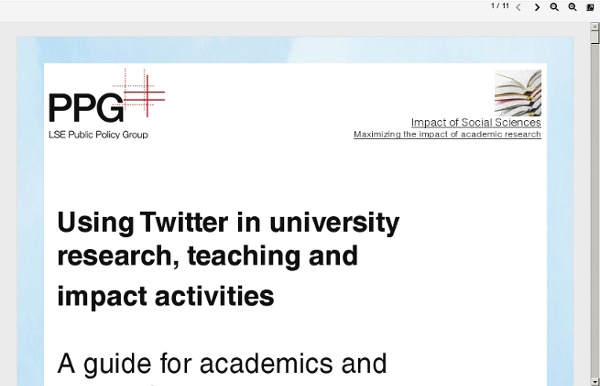



http://blogs.lse.ac.uk/impactofsocialsciences/files/2011/11/Published-Twitter_Guide_Sept_2011.pdf
Using Twitter for Curated Academic Content Twitter Fail Image (Photo credit: Wikipedia) The job of the humanities academic has always been to absorb large amounts of content, evaluate it, synthesize it, and portray the results in a way that will be relevant and engaging to an audience (whether that audience be students, peers, or the wider society). In the information age, we have a vast array of new tools to not only help us sort through this content, but also to shape it and share it. I am a big fan of the ‘whole-person’ style of tweeting, with a mixture of general chatter (e.g. “it’s Thai for dinner!”) The 10 most-useful social media tools of 2012 (so far) I'm partial to roundup posts about the latest and greatest social media tools. Compiling these posts helps me stay on top of the best ways to perform my day job. This edition features a bunch of new social media tools that you may never heard of, as well as a couple that have earned attention on the big blogs and review sites.
ISSUES Work - Outputs and Materials Posters, Diagrams and ISSUES ebulletin Understanding KT through Best Practice Maps and Reports SUE Consortia related outputs Read all about the ISSUES 2011 conference dedicated to Interdisciplinary research View the 'Interdisciplinarity Success Story' presentation by SUE researchers at IMPACT 360, February 2011
Social Media: Libraries Are Posting, but Is Anyone Listening? This is the fourth in a series of articles in which Nancy Dowd will examine the results of an exclusive survey of library professionals from more than 400 public libraries across the U.S. on public library marketing. The survey was sponsored by the NoveList division of EBSCO Publishing Nancy Dowd If there are over 1 billion people on Facebook and the Twitterverse can help topple governments, then it only makes sense that libraries would also be using these two social media channels to connect with their communities, right? Well yes and no. Libraries are using social media, that’s clear.
Twitter and the law: 10 legal risks in tweeting from or to the UK Number ten: defamatory tweets Defamation law protects a person's reputation. In England, the law of libel makes it an offence to communicate defamatory remarks where that communication takes some form of permanence (and in Scotland the general law of defamation has the same effect). At least one UK court has given the impression that communications via Twitter have a form of permanence. Defences for truth, honest opinion and providing a public service may apply. However, a claim in libel could result in civil proceedings and claims for damages and costs. National Co-ordinating Centre for Public Engagement Section: Skills & knowledge When the Government invest in research, it is with the understanding that excellent research contributes to the economy, culture and social wellbeing of society; that it makes a difference. With increased competition for public funding, it is more important to demonstrate what this difference actually entails.
Social media is more than simply a marketing tool for academic research According to Jeff Jarvis, author of Public Parts: How Sharing in the Digital Age Improves the Way We Work and Live, thanks to the internet, "we all have our Gutenberg presses and the privileges they accord." For academic institutions, the internet is a largely untapped resource for shaping and sharing scholarly research. As with the Gutenberg press, maybe professors are worried about permanently penning their ideas into cyberspace. Others may worry about privacy, especially regarding social networking. But social media and the internet have transformative powers, allowing faculty to form powerful connections and reach new audiences that previously couldn't be accessed from the ivory tower. For the past year, I've been working with the faculty and research institutes at NYU's Robert F.
Museums, libraries and archives - learning - Generic Learning Outcomes Mix and match to demonstrate impact The Generic Learning Outcomes are underpinned by a broad definition of learning which identifies benefits that people gain from interacting with museums, libraries and archives. Click on each of the five circles to reveal a more detailed description of each outcome Knowledge & Understanding Knowing what or about something Learning facts or information Making sense of something Deepening understanding How museums, libraries and archives operate Making links and relationships between things Social Media and the Devolution of Friendship: Part I “Well, you saw what I posted on Facebook, right?” I don’t know about you, but when I get this question from a friend, my answer is usually “no.” No, I don’t see everything my friends post on Facebook—not even the 25 or so people I make a regular effort to keep up with on Facebook, and not even the subset of friends I count as family.
Here's What Social Networks Know About You A read through most online privacy policies is enough to make your stomach acid curdle. And social media companies have more access to personal data than most. Some collect information you expressly give them, like your credit card and telephone numbers. Others gather data based on how and where you use their services. This might include anything from device and browser information to location intel. And some of it gets really specific — think about your last search query or ad click.